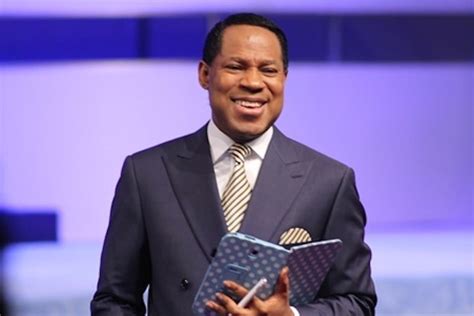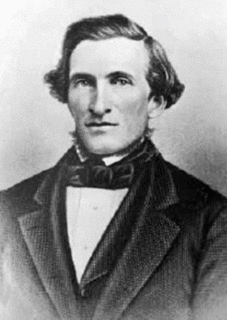A Quote by Orson Pratt
If a person trains his mind to walk in the spirit, and brings his whole mind to bear upon its operations, and upon the principles of faith which are calculated to put him in possession of the power of God, how much greater will be his faculties for obtaining knowledge. . . .
Related Quotes
The natural inclination of man is to rely solely upon himself and to ignore the purpose of his existence as well as his relationship to God who is his spiritual father. If man will recognize his divine origin, he will then realize his Heavenly Father will not leave him alone to grope in darkness of mind and spirit, but will make available a power to influence him in right paths and into standards of good behavior. The Holy Ghost is that power.
WISDOM IS dependent upon knowledge. Where there is complete ignorance there can be no wisdom, no knowledge of the right thing to do. Man’s knowledge is comparatively limited and so his wisdom must be small, unless he can connect his mind with a knowledge greater than his own and draw from it, by inspiration, the wisdom that his own limitations deny him. Only God knows all truth; therefore only God can have Real wisdom or know the right thing to do at all times, and man can receive wisdom from God. Wisdom is obtained by reading the mind of God.
According to the technical language of old writers, a thing and its qualities are described as subject and attributes; and thus a man's faculties and acts are attributes of which he is the subject. The mind is the subject in which ideas inhere. Moreover, the man's faculties and acts are employed upon external objects; and from objects all his sensations arise. Hence the part of a man's knowledge which belongs to his own mind, is subjective: that which flows in upon him from the world external to him, is objective.
In regeneration, the mind is enlightened in the knowledge of spiritual things... The will is renewed... The will is cured of its utter inability to will what is good. While the opening of the prison to them that are bound is proclaimed in the gospel , the Spirit of God comes to the prison-door; opens it; goes to the prisoner, and, by the power of his grace, makes his chains fall off; breaks the bond of iniquity, wherewith he was held in sin so as he could neither will nor do anything truly good; brings him forth into a large place.
There's an anointing the Spirit of God brings into your life; and that anointing gives you insight into the things of God. It opens the mind of God to you and unveils the riches of His glory to you. God said, "I will no longer hide my face from them," because of the outpouring of His Spirit, Hallelujah!
He who, in an enlightened and literary society, aspires to be a great poet, must first become a little child. He must take to pieces the whole web of his mind. He must unlearn much of that knowledge which has perhaps constituted hitherto his chief title to superiority. His very talents will be a hindrance to him.
The skeptic says that the believer has lost his own mind under God. On the contrary, it is the people who follow God who are most like his children, who willingly and consciously walk in his will; but those who oppose him oppose him vainly and at their own expense, and, figuratively, seem to be more like his tools. They don't diminish his glory, but instead he still manages to use them in ways of unconsciously carrying out his will.
A genius is the man in whom you are least likely to find the power of attending to anything insipid or distasteful in itself. He breaks his engagements, leaves his letters unanswered, neglects his family duties incorrigibly, because he is powerless to turn his attention down and back from those more interesting trains of imagery with which his genius constantly occupies his mind.
Who stands firm? Only the one for whom the final standard is not his reason, his principles, his conscience, his freedom, his virtue, but who is ready to sacrifice all these, when in faith and sole allegiance to God he is called to obedient and responsible action: the responsible person, whose life will be nothing but an answer to God's question and call.
Take a Nicodemus and put a Joseph Smith's spirit in him, and what do you have? Take a Da Vinci or a Michelangelo or a Shakespeare and give him a total knowledge of the plan of salvation of God and personal revelation and cleanse him and take a look at the statues he will carve and the murals he will paint and the masterpieves he will produce. Take a handel with his purposeful effort, his superb talent, his earnest desire to properly depict the story, and give him inward vision of the whole true story and revelation, and what a master you will have!
A man should not go where he cannot carry his whole sphere or society with him,Mnot bodily, the whole circle of his friends, but atmospherically. He should preserve in a new company the same attitude of mind and reality of relation, which his daily associates draw him to, else he is shorn of his best beams, and will be an orphan in the merriest club.
A man that advances in spiritual and in temporal matters at the same time, minding to keep the spiritual first, will not let the temporal lead him; he will not place his heart upon his farm, his horses, or any possession that he has. He will place his desires in heaven, and will anchor his hope in that eternal soil; and his temporal affairs will come up as he advances in the knowledge of God.
Faith in the biblical sense is substantive, based on the knowledge that the One in whom that faith is placed has proven that He is worthy of that trust. In its essence, faith is a confidence in the person of Jesus Christ and in His power, so that even when His power does not serve my end, my confidence in Him remains because of who He is.





































